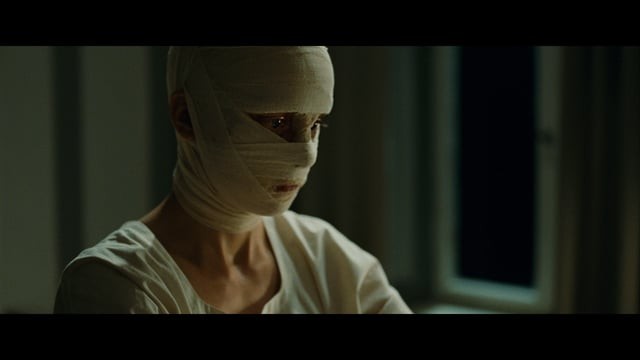
Phoenix (2014; dir. Christian Petzold)—You haven’t heard this Holocaust story before. At the end of World War II, Nelly (Nina Hoss), a German Jewish nightclub singer whose everlasting love for her husband Johnny (Ronald Zehrfeld) helped her survive the horrors of Auschwitz, returns to Berlin. Like DC Comics’ Unknown Soldier, her badly scarred face is covered in bandages. She needs reconstructive plastic surgery, but instead of altering her looks, she insists on getting as much of her old face back as she can. She also insists on trying to reconnect with Johnny in spite of some ominous rumors about his role as a Gestapo informant. After some nighttime wandering around Berlin’s Trümmerlandschaft (literally “rubble landscape”; expertly recreated here, the real thing spilled into nearly every frame of such postwar classics as Rossellini’s 1948 Germany Year Zero and Carol Reed’s 1949 The Third Man), Nelly eventually finds Johnny washing dishes at the Phoenix nightclub. When he sees her, he seems to look right through her.
At first, that is. Then Johnny gets an idea. Since this new-face Nelly, who calls herself “Esther”, looks so much like the Nelly he married (because, you know, she’s the same person), he asks her to pretend to be his wife so Johnny can get his hands on Nelly’s inheritance. Never mind that Nelly can’t convince Johnny that she is the person he’s looking for even though she knows things about their relationship she couldn’t possibly have intuited. Never mind that Johnny either has forgotten what Nelly looks like or is submerged in such a deep, stinking cesspool of self-deception that he refuses to see who is standing in front of him. Never mind that describing the plot of Phoenix makes it sound completely crass and insane. It’s insanely and crassly provocative once you half-convince yourself that it could happen somehow. It’s happened before, after all; film critic J. Hoberman saw Petzold’s film as a retelling of the Orpheus and Eurydice myth. You’ll probably see it as a somber Vertigo riff told from the point of view of the neon-green sign outside Judy’s room.
Petzold has designed a black-hearted wartime fable whose characters are pack mules dumbly hauling along ungraspable, uncomfortable ideas about human need and identity wherever they go. Nasty insinuations about memory, the past, culpability, inaction and imposture flit by in composed medium-long shot after composed medium-long shot. Hoss’ gaunt, knife-cut beauty suggests unspeakable pain and suffering, which she almost gets to articulate when she starts to tell Johnny a “made-up” story about life in the concentration camp. But Johnny cuts her off; the more he tries to control her, the more his firm sadism and imitation-Gable handsomeness slowly come to embody the banality of evil.
The final scene—a musical performance of Kurt Weill’s ballad “Speak Low” —is already famous among cinephiles who worship at the altar of the big finish; it turns on the liberation of a forearm from the confines of a long, bright red sleeve. Catch it on Netflix before it disappears into the night and fog.
Grade: A-